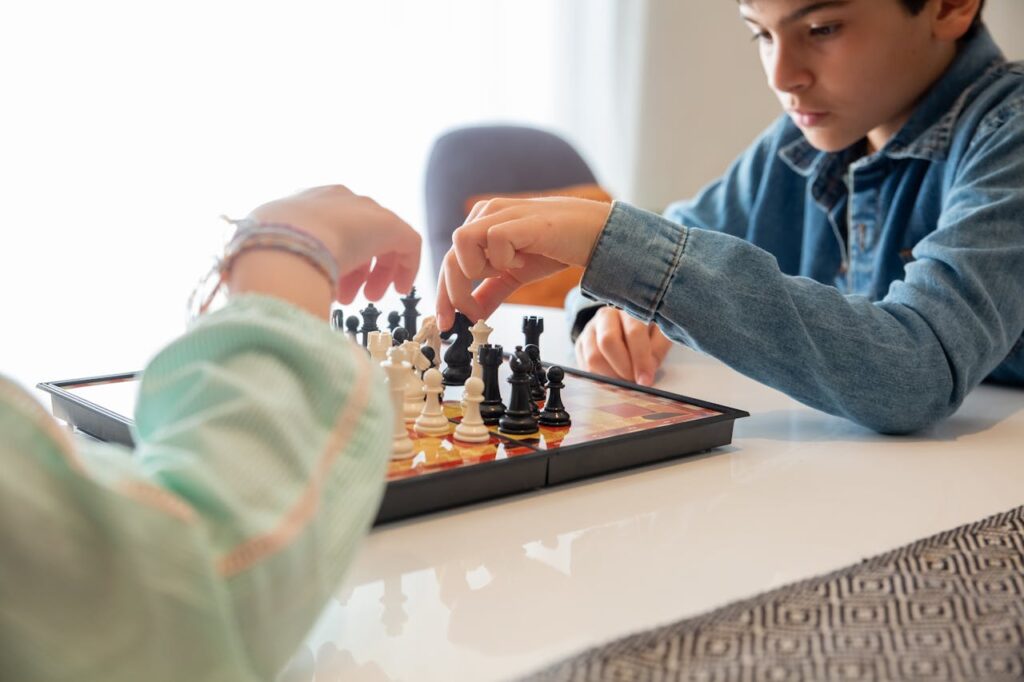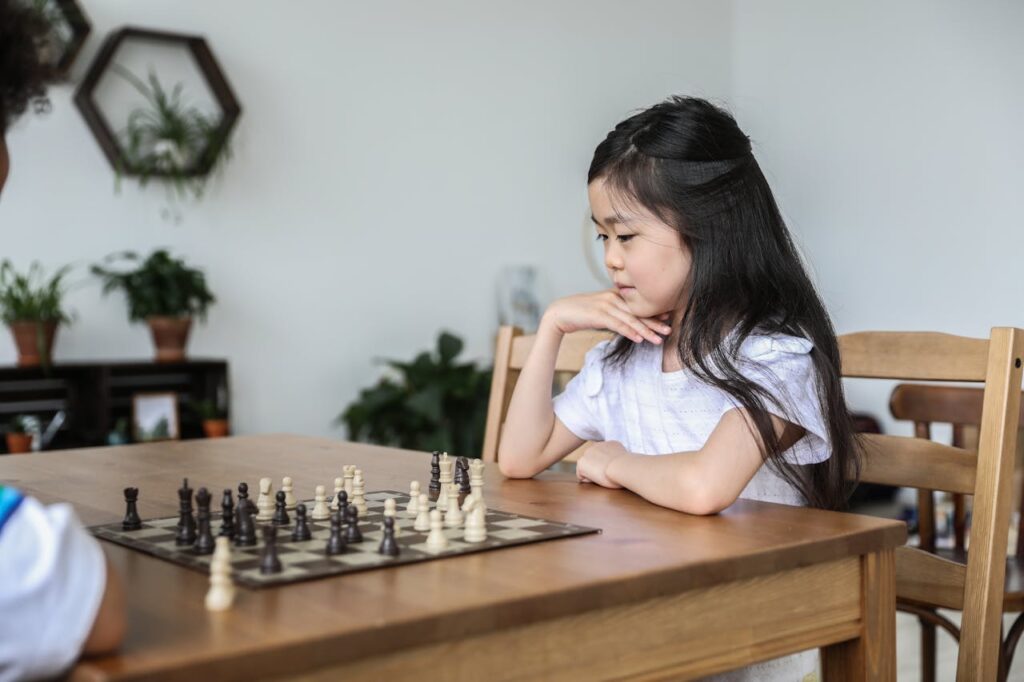Raising emotionally intelligent kids is one of the most important things a parent can do. Emotional intelligence—the ability to understand, manage, and express emotions—is a key factor in a child’s success, both academically and socially. It helps children navigate relationships, handle stress, and make thoughtful decisions. But how do you cultivate emotional intelligence in your child? One surprising yet powerful tool is chess.
How Chess Teaches Emotional Regulation
Emotional regulation is the ability to manage and respond to emotions in a healthy way. It’s a crucial skill for children to develop, as it helps them cope with challenges, handle disappointment, and stay calm under pressure.
Managing Wins and Losses
One of the first lessons chess teaches is how to handle both winning and losing gracefully.
Every game has a winner and a loser, and children quickly learn that they won’t win every time. This experience helps them develop a balanced perspective on success and failure.
When a child wins a game, they experience the thrill of success, but they also learn the importance of humility.
Chess encourages them to reflect on what they did right and how they can continue to improve, rather than becoming overconfident.
On the other hand, when they lose, they learn to manage feelings of disappointment. Instead of becoming upset or discouraged, chess teaches them to view losses as opportunities to learn and grow.
Staying Calm Under Pressure
Chess is a game that often involves intense pressure, especially as the stakes get higher during a match.
Players must make decisions quickly, often with limited time, and a single mistake can change the entire course of the game.
This pressure can be stressful, but it also provides an excellent opportunity for children to learn how to stay calm and focused in challenging situations.
By playing chess, children practice maintaining their composure under pressure. They learn to take deep breaths, think clearly, and make thoughtful decisions even when the clock is ticking.
This ability to stay calm and composed is a valuable life skill, helping children navigate stressful situations in school, sports, and social settings without becoming overwhelmed by their emotions.
Developing Patience
Patience is another key aspect of emotional regulation, and chess is a game that naturally teaches this important skill.
Unlike fast-paced games that offer instant gratification, chess requires players to think several moves ahead, carefully considering each decision before making a move.
This slow, deliberate pace helps children develop the patience needed to achieve long-term goals.
In chess, rushing can lead to mistakes, so players must learn to take their time and wait for the right moment to act.

This practice of patience helps children understand that good things come to those who wait and that success often requires careful planning and perseverance.
By learning to be patient in chess, children are better prepared to tackle long-term projects in school and other areas of life with a calm and focused mindset.
Chess and Empathy: Understanding Others
Empathy is the ability to understand and share the feelings of others. It’s a fundamental aspect of emotional intelligence, helping children build strong relationships and navigate social situations with kindness and understanding.
Anticipating the Opponent’s Moves
In chess, one of the keys to success is the ability to anticipate your opponent’s moves.
To do this, players must put themselves in their opponent’s shoes, thinking about what they might do next and why.
This practice of seeing the game from another person’s perspective helps children develop empathy.
When children play chess, they learn to consider their opponent’s thoughts and feelings, even as they strategize to win the game.
They understand that their opponent is also trying to achieve their goals and that their moves are motivated by a similar desire to succeed.
This understanding fosters a sense of empathy, helping children relate to others and appreciate the challenges they face.
Learning Sportsmanship
Chess is a game that emphasizes respect and sportsmanship.
Whether they win or lose, players are expected to shake hands with their opponents, thank them for the game, and reflect on what they’ve learned.
This tradition of sportsmanship teaches children the importance of respect, even in competition.
Through chess, children learn that it’s possible to compete fiercely while still treating their opponents with kindness and respect.
They understand that their opponent is not an enemy but a fellow player who is also learning and growing through the game.
This attitude of mutual respect is a key component of empathy, helping children build healthy and positive relationships with others.
Practicing Perspective-Taking
Chess also encourages children to practice perspective-taking, a crucial aspect of empathy.
In chess, players must constantly shift their perspective, considering not only their own position but also that of their opponent.
This practice of perspective-taking helps children develop a more nuanced understanding of others’ thoughts and feelings.
By seeing the game from different angles, children learn that there is more than one way to look at a situation.
They understand that different people may have different perspectives, and that these perspectives can be equally valid.
Chess and Building Resilience
Resilience is the ability to bounce back from challenges and setbacks. It’s a critical component of emotional intelligence, helping children cope with difficulties and persist in the face of adversity.
Learning from Mistakes
In chess, mistakes are inevitable. Even experienced players make errors, whether it’s misjudging an opponent’s move or overlooking a crucial piece.
However, these mistakes are not failures—they’re opportunities to learn and grow. Chess teaches children that every mistake is a chance to improve their skills and strategies.
When a child loses a game of chess, they have the opportunity to reflect on what went wrong and how they can do better next time.
This process of self-reflection and improvement is essential for building resilience.
It helps children understand that mistakes are not something to be feared but are instead valuable lessons that contribute to their growth.
Overcoming Setbacks
Chess is a game where setbacks are common. A well-laid plan can be disrupted by an unexpected move, or a seemingly secure position can suddenly become vulnerable.
These setbacks can be frustrating, but they also teach children the importance of perseverance and determination.
When faced with a setback in chess, players must quickly adapt and find a new strategy.
This ability to stay focused and positive, even when things don’t go as planned, is a key aspect of resilience.
Children learn that setbacks are not the end of the road but simply obstacles to be overcome.
Celebrating Small Wins
Resilience isn’t just about bouncing back from big challenges—it’s also about recognizing and celebrating small victories along the way.
Chess teaches children to appreciate the small wins that come with each game, whether it’s successfully executing a strategy, making a smart move, or simply playing a good game.

These small victories help build confidence and reinforce the idea that progress is made step by step. By celebrating these achievements, children develop a positive outlook and a sense of pride in their efforts.
This attitude of recognizing and appreciating progress is crucial for building resilience, as it helps children stay motivated and focused on their goals.
Chess and Developing Social Skills
While chess is often played one-on-one, it offers numerous opportunities for social interaction and the development of essential social skills.
Through chess, children learn how to communicate effectively, collaborate with others, and navigate social situations with confidence and empathy.
Enhancing Communication Skills
Effective communication is a key component of emotional intelligence, and chess provides ample opportunities for children to develop this skill.
Whether they’re discussing strategies, reflecting on a game, or simply interacting with other players, children learn to express their thoughts clearly and listen to others.
In chess clubs, tournaments, and casual games, children often discuss their moves, share ideas, and offer feedback.
These interactions help them develop the ability to articulate their thoughts and to listen and respond to others’ perspectives.
This practice in communication is valuable in all areas of life, helping children build strong relationships and work effectively in group settings.
Building Teamwork and Cooperation
Although chess is typically a competitive game, it also fosters a sense of teamwork and cooperation, especially when played in a club or group setting.
Children often play as part of a team in chess tournaments, where they must work together to achieve a common goal.
In these settings, children learn the importance of collaboration and mutual support. They share strategies, encourage one another, and celebrate each other’s successes.
This experience of working together towards a shared objective helps children develop a sense of camaraderie and teaches them the value of teamwork.
Navigating Social Situations
Chess also helps children navigate social situations with greater confidence and ease.
Whether they’re playing with friends, competing in a tournament, or participating in a chess club, children learn how to interact with others in a respectful and considerate manner.
In these social settings, children practice important social skills such as taking turns, following rules, and showing respect for others.
Embracing Challenges
Chess is a game that constantly presents new challenges. Each opponent is different, each game unfolds in a unique way, and every move brings new opportunities and risks.
This dynamic environment encourages children to step out of their comfort zone and embrace challenges rather than shy away from them.
In chess, children quickly learn that challenges are not to be feared but embraced as opportunities for growth.
Whether they’re facing a tougher opponent or trying to master a new strategy, the challenges presented by chess help them build confidence in their ability to tackle difficult tasks.
They understand that overcoming challenges is an essential part of learning and that each challenge they face makes them stronger and more skilled.
Learning from Failure
In chess, losing is an inevitable part of the game. Even the best players lose, and each loss is an opportunity to learn.
This experience teaches children that failure is not something to be avoided but an essential part of the learning process.
When a child loses a game of chess, they are encouraged to reflect on their moves, analyze what went wrong, and think about how they can improve next time.
This process of learning from failure is key to developing a growth mindset. It helps children understand that failure is not a reflection of their abilities but a stepping stone to success.
Valuing Effort and Persistence
Chess teaches children that success doesn’t come from talent alone—it requires effort, practice, and persistence.
Each game is a test of these qualities, as players must put in the time and effort to study strategies, practice their moves, and improve their skills.
In chess, effort and persistence are directly linked to improvement. The more a child practices, the better they become.
This experience reinforces the idea that abilities can be developed through hard work and dedication, a core tenet of the growth mindset.
Chess and Cognitive Development
While much of this article has focused on the emotional and social benefits of chess, it’s important to highlight the cognitive development that comes with regular play.
Chess is known for its ability to enhance critical thinking, problem-solving, and decision-making skills—skills that are essential for both academic success and personal growth.
Enhancing Critical Thinking Skills
Chess requires players to think several steps ahead, considering not only their own moves but also their opponent’s potential responses.
This need for forward-thinking helps children develop strong critical thinking skills.
In chess, players must evaluate the board, anticipate their opponent’s moves, and plan their strategy accordingly.
This process of analysis and decision-making is a powerful exercise for the brain, helping children develop the ability to think critically and make informed decisions.

Strengthening Problem-Solving Abilities
At its core, chess is a game of problem-solving. Each move presents a new challenge, requiring players to think creatively and find solutions.
This constant exercise in problem-solving helps children develop the ability to approach challenges with confidence and creativity.
In chess, players must consider multiple possibilities, weigh the pros and cons of different moves, and choose the best course of action.
This process of problem-solving is a powerful way to develop cognitive flexibility and resilience.
Children learn that there are often multiple ways to solve a problem and that persistence and creativity are key to finding the best solution.
Improving Memory and Concentration
Chess is a game that requires intense focus and concentration. Players must remember the positions of pieces, recall past games and strategies, and stay focused on the task at hand.
This mental discipline helps children develop strong memory and concentration skills.
In chess, memory is crucial for success. Players must remember the rules, recall past experiences, and anticipate future moves.
This practice in memory and recall helps children strengthen their cognitive abilities, making it easier for them to retain information in school and other areas of life.
Encouraging Chess as Part of Emotional Development
Given the many emotional, social, and cognitive benefits of chess, it’s clear that incorporating chess into your child’s life can be a valuable part of their overall development.
Making Chess Fun and Accessible
The first step in encouraging your child to play chess is to make the game fun and accessible. Start by introducing chess in a relaxed, enjoyable setting, such as a family game night or a casual match with friends.
Focus on the fun aspects of the game, and avoid putting too much pressure on winning or mastering complex strategies right away.
You can also use online resources, apps, and interactive tutorials to make learning chess more engaging.
At the Global School of Chess, we offer a range of online lessons, puzzles, and games designed to help children develop their chess skills in a fun and supportive environment.
Encouraging Regular Practice
Like any skill, chess improves with practice. Encourage your child to play regularly, whether it’s with family members, friends, or online opponents.
Set aside time each week for chess games, and celebrate your child’s progress, no matter how small. The more they practice, the more they’ll enjoy the game and the benefits it offers.
Integrating Chess into Emotional Learning
Finally, use chess as an opportunity to talk about emotional intelligence.
Discuss the emotions that come up during the game—whether it’s excitement, frustration, or pride—and help your child understand and manage these feelings.
Encourage them to reflect on their experiences, learn from their mistakes, and celebrate their successes.
Chess can also be a valuable tool for teaching empathy and social skills. Talk about the importance of sportsmanship, respect for opponents, and understanding others’ perspectives.
Use chess as a way to practice these skills in a safe, supportive environment, and help your child apply what they’ve learned to other areas of their life.
Conclusion
Raising emotionally intelligent kids is one of the greatest gifts you can give them, and chess is a powerful tool to help you achieve this goal.
Through chess, children learn to manage their emotions, develop empathy, build resilience, and cultivate a growth mindset—all essential components of emotional intelligence.
In addition to its emotional benefits, chess enhances cognitive development, strengthens social skills, and provides valuable life lessons that will serve your child well throughout their life.
By encouraging your child to play chess, you’re not just teaching them a game—you’re helping them develop the skills they need to succeed in school, in relationships, and in life.

